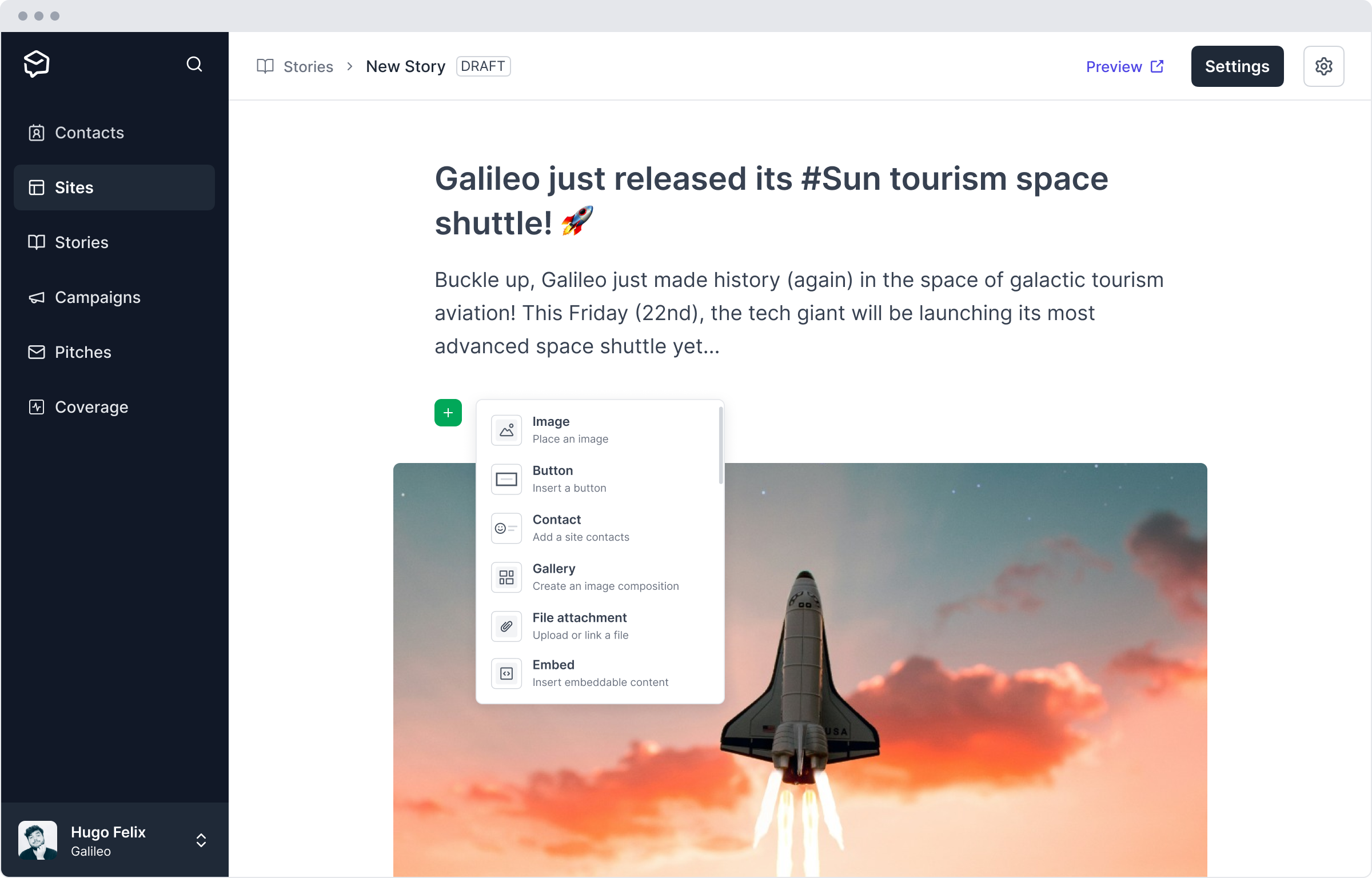Guide: How to Pitch a Podcast That You Want to Be a Guest On
Podcast guesting is one of the most overlooked opportunities in PR.
With long-form, story-driven formats and loyal niche listeners, podcasts offer the kind of trust and engagement traditional media outlets can’t always match. But with more guests vying for mic time, a great podcast pitch isn’t optional – it’s essential.
If you’re ready to land podcast interviews that actually go live, resonate with listeners, and move the needle for your brand or client, here’s your go-to guide – from writing a compelling podcast pitch email to building media contacts and avoiding the biggest pitfalls.
Podcasting is no longer a fringe medium. For PR professionals, it’s a proven channel for building influence and thought leadership.
Strong podcasts don’t chase mass audiences – they build trust with highly targeted communities. Listeners tune in weekly, take hosts’ recommendations seriously, and see guests as credible voices. Appearing on the right show can put your message in front of people who care deeply about your topic and are ready to act.
Unlike traditional media, where you’re limited to soundbites, podcasts let founders, experts, and executives share ideas with nuance. You can discuss industry trends, unpack your philosophy, and tell stories that position you as a trusted authority over time.
Podcast episodes aren’t one-and-done. Once published, they live on platforms like Apple Podcasts and Spotify for months or years. One strong appearance can continue to attract listeners, drive leads, and build awareness long after the recording
Podcasts are conversational. That intimacy creates space for vulnerability, storytelling, and genuine dialogue. Listeners often feel like they’re sitting in the room, which makes the connection stronger than in most other formats.
A podcast pitch is not just about getting airtime – it’s about showing you’ve done the work and that you’ll add value to the host’s audience. The best pitches are…
- Personalized – Reference specific episodes and moments that stood out to you. It signals real interest
- Relevant – Suggest topics that fit naturally into the show’s themes, tone, and audience expectations
- Listener-focused – Highlight what their audience will learn or gain, not just what you want to promote
- Scannable – Use a short bio, bullet-pointed topic ideas, and a clear subject line. Keep your email under 200 words

Free media pitch templates to use with journalists, editors, and influencers.
- Personalized reference to a recent episode
- Clear value for listeners
- 2–3 tailored topic ideas
- Short bio with credibility markers
- Links to past interviews or a press kit
- Clear and friendly call-to-action
Not all podcasts operate the same way. Understanding the behind-the-scenes dynamics can help you pitch smarter:
Some hosts manage their own bookings, especially for smaller or independent shows. Others rely on assistants, podcast producers, or even dedicated guest bookers to screen pitches. Make sure your message reaches the right person by checking the show’s website or LinkedIn profiles if possible.
Larger, well-established podcasts often book guests months in advance and follow a strict editorial calendar. Others, especially newer or more agile shows, may slot in interviews on short notice. Be flexible with your pitch timing and always offer availability up front.
Not all podcasts are interview-based. Some are solo shows, panel discussions, or narrative-driven. Listening to a few episodes helps you tailor your pitch to the format – what works for a Q&A won’t land on a monologue-style show.
Some podcasts offer paid guest spots or branded interviews, usually disclosed as podcast sponsorship. This can be a legitimate option if the audience aligns with your goals. However, avoid pitches from shows that demand payment without being transparent about format, reach, or promotion.
Short answer: Sometimes. Here’s what to know:
Some podcasts offer paid guest spots, branded content, or partner interviews as part of their monetization strategy. These can deliver value if the podcast has a relevant, engaged audience and provides clear promotion. Always ask what’s included – mentions, links, ad slots, or social shares – before committing.
Be cautious if a show requires payment but offers little detail about its audience, format, or distribution. A lack of transparency around sponsorship terms, listener numbers, or promotion plan is a sign to walk away. Reputable podcasts are upfront about their process and pricing.
Not every podcast appearance is worth your time or budget. Consider audience size, listener engagement, topic fit, and production quality. A smaller show with the right niche following can outperform a big-name podcast that doesn’t align with your goals. Think ROI, not just reach.
Use this simple structure to craft a podcast pitch email that gets noticed:
Open with a compliment or reference to a recent episode:
“I loved your recent conversation with [Guest] about [Topic] – especially the point about [Insight].”
Explain what you bring to the table and how it benefits listeners:
“I help [Audience] with [Solution], and I’d love to share actionable insights on…”
Include a brief bio and past media or podcast appearances:
“I’ve been featured in [Media Outlet] and interviewed on [Other Podcasts].”
Invite collaboration, suggest a few topic ideas, and share your availability:
“Happy to send more info or tailor the discussion to your audience.”
Subject line: Idea for your podcast: [Specific topic or angle]
Hey [Podcast Host Name],
I’m a long-time listener, and your recent episode with [Guest] really stuck with me – especially when you discussed [Insight].
I’d love to join you on the show. I work with [Who you help] to [What you do], and I think your audience would enjoy a fresh take on:
- [Topic idea 1]
- [Topic idea 2]
- [Topic idea 3]
I’ve recently appeared on [Other Podcasts] and featured in [Media Outlets].
Would you be open to chatting about a potential interview?Best,
[Your Name]
[Your Website]
[Links to a past interview or press feature]
- Warm up the host – Engage with their posts on LinkedIn or X before pitching. Familiarity helps
- Write a strong subject line – Keep it short and value-driven
- Include links – Past interviews, a press kit, or your website. Make it easy to vet you
- Time your send – Midweek mornings (Tuesday–Thursday, 10–11am local time) often perform best
- Keep it brief – Aim for under 200 words
- Generic copy-paste intros with no personalization – Hosts can spot a mass email instantly. If your pitch could go to any podcast, it’ll likely go to the trash. Reference their show specifically to show you’ve done your homework
- Promoting a product instead of offering a story – A pitch that reads like an ad won’t land. Focus on value, insights, or a compelling story – not just pushing a book, app, or service
- Not listening to the podcast first – Skipping this step is one of the fastest ways to miss the mark. Listen to at least one or two episodes so you understand tone, audience, and style before reaching out
- Offering irrelevant or off-brand topics – If your pitch doesn’t clearly fit the show’s theme, it won’t resonate. Make sure your suggested topics align with what the host typically covers and what the audience expects
- Ignoring past guest formats or style – Every show has a rhythm – some are casual and conversational, others are structured or tightly edited. Tailor your pitch to reflect the show’s format and vibe
%20%F0%9F%8E%A7.jpg)
No time to read? Hate words? Listen to these PR podcasts instead to gather insights on trending topics & PR best practice
Pitching podcasts effectively takes more than a good story – it takes consistency, follow-up, and organization. That’s where a platform like Prezly can give you a serious edge.
Prezly helps you streamline every step of your podcast outreach:
- Build and manage your media database – Keep a centralized, up-to-date list of podcast hosts, producers, and media contacts so you’re always pitching the right person
- Track pitch emails and responses – See who’s opened your emails, track replies, and stay on top of follow-ups without letting anything slip through the cracks
- Share stories, bios, and assets seamlessly – Create dedicated press rooms or story pages that make it easy for podcast hosts to review your pitch, bio, talking points, and media assets in one click
- Organize past podcast appearances – Keep links to past interviews and relevant materials in one place so you can reference them quickly in future pitches
With the right tools, pitching podcasts becomes less of a one-off effort and more of a repeatable, scalable strategy.

Prezly makes it easy to host multimedia assets and share them with your most important contacts. Send your next pitch with a free trial of Prezly, no credit card required.
Start 14-day free trial